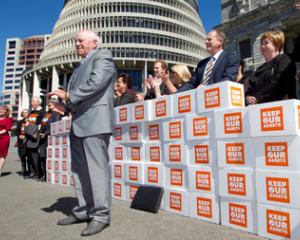Thousands of people have turned out in Auckland today to protest against the government's plan to sell off its stakes in state-owned companies.
Police say about 2000 people, many carrying placards and chanting anti-government slogans, turned out for the march up Queen Street this afternoon.
The Stuff website had the number at 8000.
The protesters oppose the government's plan for the partial privatisation of state-owned energy companies Mighty River Power, Meridian, Genesis Energy and coal miner Solid Energy.
National campaigned on the proposed sales in last year's election.
Among those in attendance were Labour Party leader David Shearer, Green Party co-leader Russel Norman and Mana Party leader Hone Harawira.
Mr Shearer told the crowd that the Labour Party will fight to keep state assets in Kiwi hands.
"These assets are ours," he said.
Mr Norman said that the spirit of the protesters is "undefeatable".
"We are standing here today amongst friends who understand what it means to invest in the future of our country, not to sell it off."
One protester, Phil, said he's concerned about profits going offshore.
"We've already sold the best of the family silver. Why should we be selling what's left of it?" he said.
Another protester, Molly, said selling state-owned assets is not the best option for New Zealand's future.
"It's taking something that belongs to the people, that people's tax money has paid for, that technically they own, and then selling it off for short-term profit."
A parliamentary select committee has begun hearing submissions on the government's Mixed Ownership Model Bill.
Most submissions so far have been opposed to the bill.
The wording for a petition for a citizens' initiated referendum on asset sales has been given approval.
The agreed wording is: "Do you support the government selling up to 49 percent of Meridian Energy, Mighty River Power, Genesis Power, Solid Energy and Air New Zealand?"
A referendum will be forced if 10 percent of people on the electoral roll sign the petition, but the result is not binding on the government.





